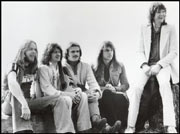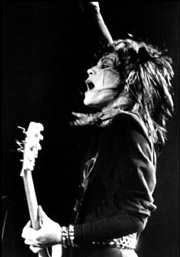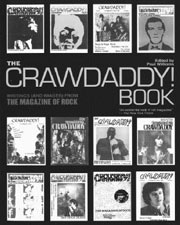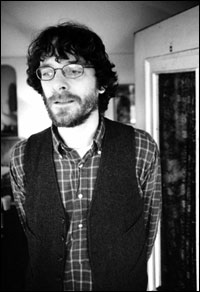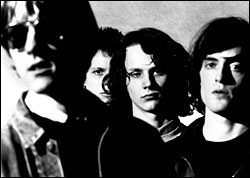It’s been ages since Johnny Rotten famously scrawled “I Hate” over a Pink Floyd T-shirt logo, clearly drawing a line in the sand. Quaint though it may seem now, the punks-vs.-dinosaurs credo meant that a lot of progressive rock bands from the pre-’77 era took it on the chin from punters and critics alike.
Perhaps most unfashionable of all was Yes. The band didn’t do themselves any favors by festooning their gatefold record sleeves with fantastical Roger Dean artwork and apparently commissioning Spinal Tap’s stage and costume designers for their tours. Complex, neoclassical tunes that made up entire album sides? Please. Gimpy psychobabble song titles like “The Revealing Science of God” or “Universal Garden”? Fuhgeddaboutit—gimme a “God Save the Queen,” a “White Riot,” or an “Orgasm Addict”! Sci-fi/New Agey album names like Tales From Topographic Oceans and Keys to Ascension? Conceptual bollocks to that, mate! And apocryphal or not, the yarn about Yes keyboardist Rick Wakeman having a direct hand in getting the Sex Pistols booted from A&M Records attained deeply symbolic status among those who needed to nurture a loathing for all things prog.
Still, Yes has had its, dare we say it, kick-ass moments; yours truly, who saw ’em many times during their ’70s salad years, can testify to that. And the band, for all its labyrinthine lineup changes over the years (even—gleep!—the Buggles were Yesmen for a spell), was always made up of genuinely gifted musicians. As time—and the occasional boxed set—heals all wounds, the new Elektra/Rhino collection In a Word: Yes (1969— ) offers an opportunity for reassessment.
The impressive anthology traces chronologically the band’s three-decade-plus history across five discs of hits, album classics, and a handful of unreleased tracks. The 96-page booklet features lengthy essays from Yes biographer Chris Welch and prog rock expert Bill Martin, plus an appreciation penned by film director Cameron Crowe, who reveals the origins of a key scene in Almost Famous to be a backstage interview encounter he had with Yes when he was a cub reporter for Rolling Stone. (Also worth noting: Just out is Symphonic Live, a concert DVD filmed on the 2001 Magnification tour, and Beyond and Before: The Formative Years of Yes, a book jointly authored by original Yes guitarist Peter Banks and rock historian Billy James.)
All that aside, we’re mindful of the fact that some of you simply won’t buy some pinhead critic’s revisionist ranting (but feel free to ask me anytime about running into members of Yes in a shopping mall, circa 1974, while I was dosed to my topographic gills with LSD). A golden opportunity beckoned when Yes announced its In a Word tour—featuring what to many fans represents the primo Yes lineup of Wakeman, vocalist Jon Anderson, guitarist Steve Howe, bassist Chris Squire, and drummer Alan White—would open July 17 at Seattle’s Paramount Theatre. See, we’d heard that America’s so-called “hip/indie/underground” rock community contains its share of closeted Yesfreaks. And one of them, it has been rumored, walks among us, in this very burg!
So being professional journalists, we outed local legend Kurt Bloch (Fastbacks, Young Fresh Fellows), gave him tickets to the concert, and asked for a report.
“Oh, it was great!” exclaims Bloch, adding with undisguised enthusiasm that he was also lucky enough to catch a warm-up gig that Yes did at EMP’s Sky Church a couple of nights prior. “The audience was mostly the age group 40- through 55-year-old men. Not a lot of women there! Some 30s-ish rocker guys—although I can’t imagine a bunch of 30-year-olds who grew up on MTV, Billy Idol, Duran Duran, saying, ‘Yes is in town. We gotta go!'”
 Maybe, maybe not. A little more probing of Bloch and it comes out that his close friend, singer-songwriter John Wesley Harding, is such a Yesbuff (“He’s sick for them—calls me while he’s on tour to tell me what Yes albums he’s found”) that he bought Bloch a $100 ticket so the two could attend Yes’ Magnification symphonic show last year in New York. The Yes box itself features glowing testimonials from the likes of Primus’ Les Claypool, Phish’s Jon Fishman, Tool’s Danny Carey, and Pearl Jam’s Stone Gossard. Indie-pop chanteuses Beth Orton and Mary Timony are both rumored to be fans, and the latter’s solo albums display obvious prog leanings. And going back a bit, there’s an old Replacements story that has Bob Stinson trying to steer kid brother Tommy away from juvenile delinquency and into music by buying him an amp and teaching him to play “Roundabout.”
Maybe, maybe not. A little more probing of Bloch and it comes out that his close friend, singer-songwriter John Wesley Harding, is such a Yesbuff (“He’s sick for them—calls me while he’s on tour to tell me what Yes albums he’s found”) that he bought Bloch a $100 ticket so the two could attend Yes’ Magnification symphonic show last year in New York. The Yes box itself features glowing testimonials from the likes of Primus’ Les Claypool, Phish’s Jon Fishman, Tool’s Danny Carey, and Pearl Jam’s Stone Gossard. Indie-pop chanteuses Beth Orton and Mary Timony are both rumored to be fans, and the latter’s solo albums display obvious prog leanings. And going back a bit, there’s an old Replacements story that has Bob Stinson trying to steer kid brother Tommy away from juvenile delinquency and into music by buying him an amp and teaching him to play “Roundabout.”
Further, in our investigations we turned up another notable Yesfan, thirtysomething Steven Drozd, multi-instrumentalist for the Flaming Lips.
“You came to the right guy!” says Drozd excitedly, when we ring him up in St. Louis where the Lips are about to start a tour. “I had older brothers in the ’70s, and they listened to all that stuff. I grew up on The Yes Album, Fragile, Close to the Edge. Then in high school, I went the ‘college rock’ route, Psychedelic Furs, R.E.M., then into indie rock like Sonic Youth, Pixies. . . . Being part of the hip, underground world of the early ’90s, the last thing you could ever admit to listening to was Yes. But I was on tour around the summer of ’94, and in this thrift store I saw Fragile on cassette. So I secretly started listening to Yes on my Walkman. I played ‘Heart of the Sunrise’ for Wayne [Coyne of the Lips] and he loved that, so we all started listening to Yes and other prog stuff like King Crimson [and] Emerson, Lake & Palmer.”
Drozd, who has a photo of—we are not making this up—Rick Wakeman affixed to his keyboard and has been known to sound check on piano licks from Yes’ “South Side of the Sky,” recalls being on the road and hanging out with Jeff Buckley. Buckley was, you guessed it, a massive Yes fan. “I put on Fragile, and Jeff just freaked out: ‘God, man, nobody listens to this stuff anymore—I love this album!'”
Drozd also proudly announces that he and a drummer friend are toying with the idea of doing a Yes tribute band, saying, “We’re thinking of calling it Yeah and [doing] the classic Roger Dean-style logo, but instead of ‘Yes,’ it’ll be ‘Yeah.’ He’s 29 and I’m 33, so we’re just young fans, comparatively. But we’re certainly enthusiastic about the records!”
Back to Kurt Bloch, who drops his own bombshell: He actually has played in a Yes tribute band. As it turns out, Yes drummer Alan White lives in Redmond, and about a year and a half ago, the trapsman was persuaded to take part in a one-off Yes covers gig featuring himself, Bloch, ex-Posies bassist Joe Skyward, a keyboardist, an additional guitarist, and Skyward’s 16-year-old daughter (on vocals).
Recalls Bloch, “We did ‘Yours Is No Disgrace,’ ‘Heart of the Sunrise,’ ‘Starship Trooper,’ ‘South Side of the Sky’—which Alan said, ‘Oh, we can’t do that one! Yes couldn’t even play that one live!’ It’s super hard to do. Although they are doing it now on the current tour. [laughing] Maybe we had a small effect on that, getting him to play it once, and him maybe bringing it up to the others.”
So what’s the key to Yes’ enduring appeal? And did Johnny Rotten really mean it, maaan?
“When punk rock came out, everybody was, ‘Yeah, fuck that shit, man! Fucking Yes!’ But that was 25 years ago, and so many people now don’t even know you weren’t supposed to like, say, the Damned and King Crimson at the same time,” says Bloch. “Now, people hear Pink Floyd and go, ‘Wow, that’s great!’ Then you play the Clash: ‘Wow!’ Now, it’s a totally nonissue. . . . Yes was the quintessential prog band, but they really had something. It was [never] a case of there not being any spontaneity. Talking to Alan White, the interesting thing that I learned is that there are times in all those complex pieces that the people can play whatever they want. I don’t think Steve Howe plays the same way every night—and I know that Alan doesn’t play the same way every night.
“And they’re one of those bands that’s kind of defined by their material—no other band can really play those songs. Their band and their material are synonymous, really. Whereas a lot of bands that have a lot more ‘regular’ songs, well . . . with Yes, it’s almost like it is classical music, but Yes is the only orchestra capable of playing it.”
As Cameron Crowe writes in the Yes box, “Wherever you go, wherever you find a record collection of essentials, go to the end and work backward just a bit. You’ll find them there. Years later, they’re still together, no longer just a band, but the owners of a genre all their own. Yesmusic.”
